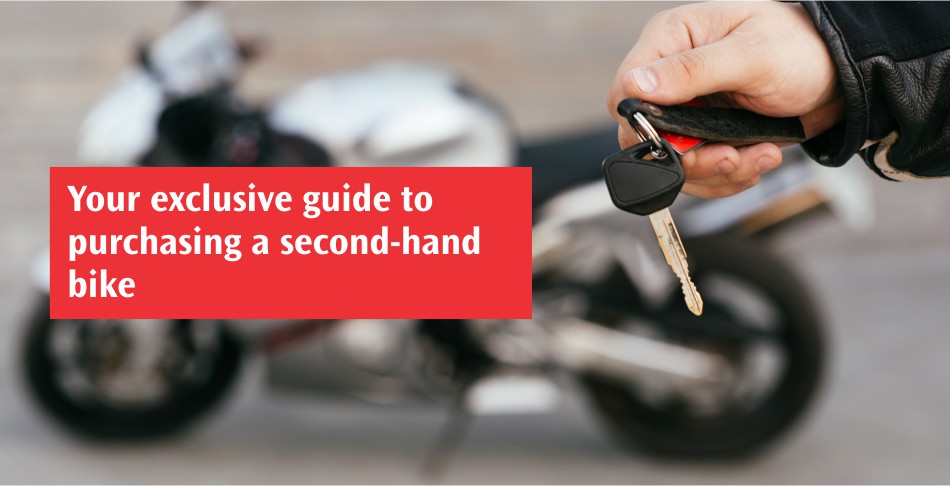Your exclusive guide to purchasing a second-hand bike
Your exclusive guide to purchasing a second-hand bike
Published on April 14, 2021. EST READ TIME: 4 minutes

There are numerous reasons why you might want to buy a second-hand bike. If you want to learn to ride a bike, a second-hand bike is a better option than a new one because you run the risk of damaging and scratching the bike while learning. Why purchase a new one? There is also the possibility that you are looking for a model that has been discontinued. Or perhaps you do not have the funds to purchase a new bike. Furthermore, for people who take frequent long trips and thus use the bike much more than the average person, purchasing a second-hand bike is the sensible way to go.
For all of the above reasons or more, before you purchase a second-hand bike, there are many things a potential buyer should know and understand. And, before we nose-dive straight to the documentation, we would like to walk you through the considerations you should bear in mind before investing in a second-hand bike.
Considerations for buying a second-hand bike
When purchasing a used bike, there are a few critical considerations to bear in mind.
First, ensure that you are purchasing from the bike's actual owner, whose name appears on the bike registration certificate.
Second, ensure that the bike is in good mechanical condition. You can contact any authorised service centre of the bike’s manufacturer to find out when the bike was last serviced.
Third, ensure that the bike has not been involved in any road accidents or other criminal cases.
Fourth, ensure that there are no pending challans on the bike. The local traffic police can assist you with this information. Also, if any, ensure that they are paid off before you purchase the bike.
Fifth, ensure that all repairs, particularly those following an accident, have been performed by the bike manufacturer’s authorised service centre.
Sixth, ensure that you have been handed over two sets of bike keys along with the documents such as bike registration card, PUC and copy of the bike insurance policy when you purchase the bike
Transfer of bike registration
It is time to seal the deal once you have satisfied yourself with all of the basic conditions and have negotiated the price. You must pay the amount to the bike owner and return to the RTO the next day to apply for the transfer of ownership and registration to the RTO office where the bike was originally registered. A few documents must be filled out and signed by both the seller and buyer. These include:
Form 28, which pertains to the transfer of the ownership of the bike
Form 29, which is a no-objection certificate. Both the bike transferor and the transferee must sign this document.
Form 30, which is an intimation of the bike's transfer to its new owner. This is an acknowledgement that the transferor has given the transferee possession of the vehicle.
Bike documents, such as a valid registration certificate, PUC and a copy of the bike insurance policy
Address proof and photos of the new buyer
Transfer of bike insurance
Once the deal is finalised, you must apply for transferring the bike insurance policy to the current insurer within 14 days. You must submit papers such as the bike’s current insurance policy, the new owner’s registration card of the bike, or the proof of sale and transfer of the vehicle, address proof of the new owner, and photos. In addition to this, the insurance company can request any additional documents that must be submitted. The insurance company will usually issue the new policy within a few days.
The compulsion of transfer within 14 days
Upon the sale of a second-hand bike, the THIRD-PARTY BIKE INSURANCE COVER of the old original insurance coverage remains in effect for 14 days. This 14-day window is given to the new buyer to complete or at least begin the ownership transfer process.
If the bike insurance policy is not transferred within 14 days, the old two-wheeler insurance is no longer considered valid. This means that you are riding an uninsured bike, which is a punishable offence in the eyes of the law. In case a traffic police officer stops you and requests proof of two-wheeler insurance, the previous owner’s policy will be deemed invalid. You can be fined up to INR 2,000; however, repeat offenders can face up to 3 months imprisonment.
Conclusion
Many people are opting for second-hand bikes. However, before you purchase one, it is advisable that you keep the aforementioned considerations in mind. Especially, make sure that you transfer your second-hand bike insurance promptly to avoid getting fined.
Disclaimer: The above information is for illustrative purposes only. For more details, please refer to policy wordings and prospectus before concluding the sales.
This blog has been written by:
Mukesh Kumar | Motor Insurance Expert | 36+ years of experience in insurance industry
A veteran in the insurance industry, Mukesh Kumar has the expertise of handling various functions like Business Development, Underwriting, Claims, Human Resources, Quality Management and Marketing. With rich knowledge of the industry, he loves to share his views on topics of insurance sector and takes special interest in educating people on advantages of having insurance
Few Other Articles:
-
Want the best value when you sell your used two-wheeler? Here are 10 tips
-
Buying a pre-owned bike ownership and insurance transfer are a must. Here's how.










 Health Insurance
Health Insurance  Travel Insurance
Travel Insurance  Car Insurance
Car Insurance  Cyber Insurance
Cyber Insurance  Critical Illness Insurance
Critical Illness Insurance
 Pet Insurance
Pet Insurance
 Bike/Two Wheeler Insurance
Bike/Two Wheeler Insurance  Home Insurance
Home Insurance  Third Party Vehicle Ins.
Third Party Vehicle Ins.  Tractor Insurance
Tractor Insurance  Goods Carrying Vehicle Ins.
Goods Carrying Vehicle Ins.  Passenger Carrying Vehicle Ins.
Passenger Carrying Vehicle Ins.  Compulsory Personal Accident Insurance
Compulsory Personal Accident Insurance  Travel Insurance
Travel Insurance  Rural
Rural 











